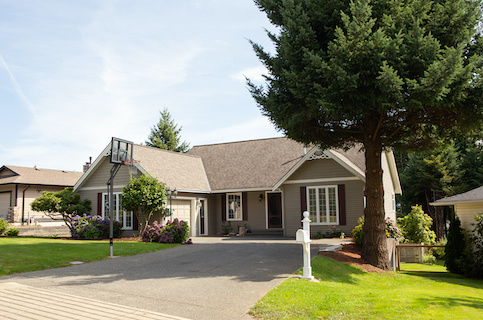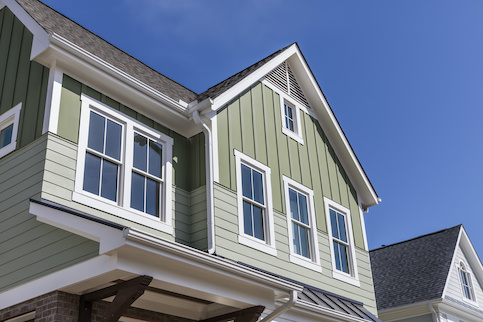Effective Nov. 16, 2025, both Fannie Mae and Freddie Mac no longer require a specific minimum credit score for conventional loan approval. Instead, loan decisions will be based on an analysis of overall credit risk factors.
If your first mortgage was an FHA loan, and you’re tired of paying FHA mortgage insurance premiums, you may be a good candidate to refinance an FHA loan to a conventional loan. Some homeowners save a substantial amount of money with this refinance, especially if they can switch to a conventional loan and drop mortgage insurance.
Read on to learn more about FHA-to-conventional loan refinances, the financial requirements and the pros and cons.
Can You Refinance An FHA Loan To A Conventional Loan?
Yes, you can refinance your FHA loan to a conventional loan. Many borrowers do just that once they’ve increased their credit score and built equity in their homes.
Many borrowers refinance an FHA loan to conventional to eliminate the required mortgage insurance on FHA loans. Borrowers who went with an FHA loan when they bought their home usually picked it because they have a lower credit score, higher debt-to-income ratio (DTI) or plan on making a smaller down payment.
While a borrower can get a conventional loan for 3% down, they won’t qualify if they can’t meet the loan’s 620 minimum credit score requirement.
FHA loans have more flexible underwriting guidelines, making it easier to qualify for financing. But once a borrower improves their financial situation, a conventional loan may be an option.
See What You Qualify For
Buy A Home
Discover mortgage options that fit your unique financial needs.

Refinance
Refinance your mortgage to have more money for what matters.
Tap Into Equity
Use your home’s equity and unlock cash to achieve your goals.
How Soon Can I Refinance An FHA Loan To A Conventional Loan?
Most conventional loans are conforming loans. This means they meet Fannie Mae and Freddie Mac’s guidelines. Since Fannie Mae and Freddie Mac don’t require a waiting period for rate-and-term refinances, you can refinance from an FHA loan to a conventional loan whenever you qualify.
However, if you want to tap into your home’s equity with cash-out refinance, you may need to wait 6 months or longer to build enough equity in your home.
Requirements To Refinance From An FHA Loan To Conventional
You must meet conventional loan requirements to take advantage of an FHA to conventional refinance. Fortunately, the requirements aren’t as challenging to meet as many borrowers assume.
Here’s what’s required:
- 620 minimum credit score: Check your credit score. You need at least a 620 credit score to qualify for a conventional loan. The higher your credit score, the better terms you’ll get when refinancing.
- 50% or lower debt-to-income ratio (DTI): Your debt-to-income ratio measures your monthly debts against your gross monthly income. Conventional loans allow a DTI of up to 50%. And like your credit score, the better your DTI is, the better terms you’ll get.
- 3% – 5% home equity: The more home equity you have, the better. You earn equity when your home’s value increases and when you make your regular monthly mortgage payments. You may qualify for a conventional loan with at least 3% – 5% equity.
- Proof of home’s value: You pay for a new appraisal when you refinance an FHA to conventional. Lenders must have proof of the home’s value to ensure there is at least 3% – 5% equity in the house.
- No other outstanding liens: Your title must not show any other outstanding property liens, such as unpaid taxes, judgments, mechanic’s liens or other mortgage loans. However, an exception can be made if the lender for a second mortgage agrees to subordinate the debt to the new conventional loan.
Advantages Of An FHA-To-Conventional Loan Refinance
Refinancing from FHA to conventional isn’t for everyone, but here are the most common reasons borrowers consider it.
It Can Cancel Mortgage Insurance
The most popular reason borrowers refinance FHA loans to conventional loans is to eliminate mortgage insurance. The FHA mortgage insurance premium (MIP) is an insurance policy you pay for. It protects your lender if you stop making payments on your mortgage.
All FHA loan borrowers must pay MIP regardless of the size of their down payment. If you put down at least 10% on a home, you’ll make a one-time, upfront MIP payment and ongoing MIP payments for 11 years. If you put down less than 10%, you’ll make a one-time, upfront MIP payment and pay MIP for the life of the loan.
Conventional loans also have mortgage insurance called private mortgage insurance (PMI). With a conventional loan, the amount a borrower pays in PMI is determined by their credit score and the home’s loan-to-value ratio (LTV). So the less money you put down, the more PMI you pay.
Homeowners can request PMI cancellation once they owe less than 80% of the home’s original appraised value. Even if homeowners don’t request to cancel PMI, lenders must automatically cancel it when homeowners reach 22% home equity or 78% LTV on the home’s original appraised value.
If a borrower already has 20% equity in their home, they can refinance an FHA loan to a conventional loan and eliminate mortgage insurance.
You May Lock In A Lower Interest Rate
Borrowers often refinance into a conventional loan to take advantage of lower interest rates. Timing the refinance of an FHA loan to a conventional loan when rates are lower can save homeowners money.
Refinancing to a conventional loan works best when borrowers also improve their credit score because lenders use credit scores to determine the interest rates they offer.
You Can Cash Out Your Home Equity
Another reason to refinance FHA to conventional is to tap into a home’s equity. A cash-out refinance can fund home repairs or renovations, pay off debt or bulk up retirement or college savings.
Because homeowners must leave at least 20% of the equity in their home untouched, a cash-out refinance works best when a homeowner has a significant amount of equity in their home. While you can opt for an FHA cash-out refinance, monthly MIP payments often make it unaffordable.
Conventional loans don’t require PMI on cash-out refinance loans because homeowners can’t borrow more than 80% of a home’s value.
Disadvantages Of An FHA-To-Conventional Loan Refinance
Like any refinance option, there are downsides to refinancing from FHA to conventional. Understanding these downsides can help you make an informed decision.
You Have To Cover Closing Costs – Again
Each time you refinance, you must pay closing costs. Closing costs typically average 2% – 6% of the total loan amount, and can add up quickly. Decide whether the benefits outweigh the cost before you commit to refinancing.
The key is determining how long you’ll stay in the home and what you want to do with the money, especially for a cash-out refinance. Do you have other ways to get the cash you need or does refinancing your home make the most sense?
You Have To Repeat The Loan Approval Process
Yes, you’ll have to repeat the loan approval process, but it should be easier to manage this time because you’ve done it before. While lenders make the loan approval process as easy as possible, you’ll still need to put in some time and effort to collect the financial documentation that proves you can afford the loan.
You must regather the following documents to refinance:
- W-2s
- Tax returns (for self-employed borrowers)
- Recent pay stubs
- Bank statements
- Homeowners insurance verification
- Proof of employment
You may also pay for a refinance appraisal to determine the home’s value.
You May Still Pay Mortgage Insurance
There’s still a chance you may pay mortgage insurance if you switch your mortgage with a cash-out refinance and have less than 20% equity in the home. If your lender lets you borrow more than 80% of the home’s value, you may need to pay PMI until you hit the 80% threshold. You can cancel PMI once you’ve paid your balance down to 80%.
Alternatives To An FHA-To-Conventional Refinance
Homeowners who don’t qualify for an FHA-to-conventional refinance can try an FHA Streamline Refinance. With this product, FHA loan borrowers can refinance without needing to verify much to get approved.
To qualify for an FHA Streamline Refinance, borrowers must:
- Have an existing FHA loan
- Not have any delinquent payments in the last 12 months
- Prove they will gain a net tangible benefit from refinancing
The Bottom Line: A Refinance From FHA To Conventional Loan May Cut Costs
Homeowners can refinance FHA to conventional loans at some point during homeownership as long as they meet conventional lender requirements. But make sure refinancing makes financial sense for you. If you’re thinking about refinancing your FHA to conventional loan, consider the financial effects of potentially restarting your loan term and paying closing costs. Then weigh that against the hundreds or thousands you may save when you cancel mortgage insurance.
Find A Mortgage Today and Lock In Your Rate!
Get matched with a lender that will work for your financial situation.

Sam Hawrylack
Samantha Hawrylack is a full-time personal finance and real estate writer with five years of experience. She has a bachelor's degree in finance and an MBA from West Chester University. She writes for publications like BiggerPockets, Angi, Well Kept Wallet, Crediful, Clever Girl Finance, AllCards, InvestingAnswers and many more.












